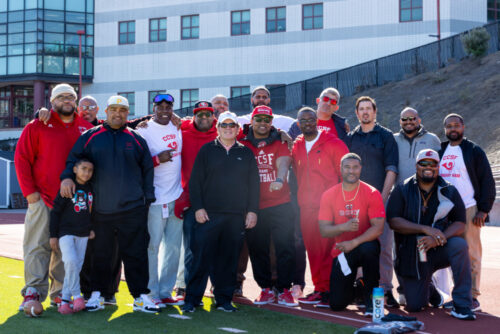Treasures of City College: George M. Rush Stadium Sports a Gorgeous Setting and Winning Record
Part two of the Treasures of City College article series.
By Gene Thompson
gthomp11@mail.ccsf.edu
The view from the top seats in George M. Rush Stadium is spectacular. On a clear day the vista takes in the nearby Sunnyside neighborhood, climbs Bernal Heights and Potrero Hill and spreads across the bay, beyond Alameda to the wilderness areas where Mount Diablo rises, the last visible object to the east.
But the great treasure of the stadium is what takes place on the turf, track, and in the 5,000-seat bleachers where fans cheer their teams’ successes and bemoan their failures.
To Jimmy Collins, head coach of the City College Rams football team, the value of the stadium is strategic. “Our stadium is a major home field advantage,” he says. “Playing here is intimidating for opponents.”
The stadium’s namesake George M. Rush played two seasons for City College in 1966 and 1967 as a defensive back. Five years later he returned as an assistant coach and in 1977 was named head coach.

Don Collier/The Guardsman
Coach Rush’s fiery determination to win caused controversy as some felt his recruitment and support of players from all over the country exceeded the rules. But win he did. In 38 years Rush had a record of 326-93-4, seven state and seven national championships. He sent multiple players on to play at four-year colleges, some continuing on to play football professionally. The facility, previously called Rams Stadium, was renamed in his honor upon his retirement in 2015.
The seating is perfectly situated so that spectators can choose sun or shade while the weather is still good through early autumn. Despite the brilliance of Rams football year after year, the seats are rarely filled, except, as Collins says, during “big games.”
Often many of the spectators are bussed in from visiting teams’ hometowns.
Even while watching their team being dismantled by the ferocious Rams, opposing fans appreciate a good thing when they see it. “Beautiful view,” one losing San Joaquin Delta College fan said recently. “Nice campus. You don’t see this kind of thing much in the Stockton area we’re from.”
The track is often used by residents from the surrounding communities of Sunnyside, Ingleside and Excelsior. Many expressed their appreciation for the facilities.
David Goldberg, a professional photographer, lives in the nearby Ingleside neighborhood. “I come out here and I run two miles,” he said. “And I studied photography at City College.” He said he loves the stadium, except the limited bathroom access.
Erica Wright, also from the Ingleside area, said she comes almost everyday. “I like to stay fit, and this is basically right in my front yard, so it makes it easy.”
According to Justin Labagh, chair of the Physical Education, Athletics and Dance Department, the track and field team used to use the stadium but the team was eliminated due to budget cuts.
Rush bequeathed the head coach position to Collins, who had been Rush’s quarterback in 2005. Like Rush, he returned as assistant coach, served six years in that capacity, and took the handoff from his coach. Since then, Collins has established himself as, if not yet his mentor’s equal, on his way to becoming so. His many accolades include All-American Coach of the Year in 2015 and 2021.
Like his mentor, Collins has greatly influenced the lives of players. According to the City College Athletics Department website, during Collins’ tenure, “139 of his players transferred to four-year colleges. Of those transfers, 82 continued their careers with Division 1 programs, and a total of 100 players earned scholarships.”
Collins pays tribute to Rush’s achievement in the stadium that bears his name. “Coach changed the lives of thousands of kids and changed the entire landscape of junior college football. Maintaining this program is an honor of a lifetime.”
The Rams won their final home game of the season at George Rush Stadium on Oct. 28. In their last regular season game, on Nov. 11, they were handed their first defeat by the San Mateo Bulldogs at College of San Mateo. They travel to Beaver Stadium in Sacramento to battle American River College in the regional semifinals on Nov. 25. Kickoff will be at noon.
